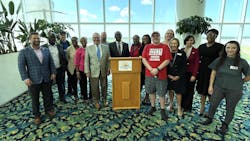Orange County, Fla., transit advocates launch Move Orange County Forward initiative
Orange County, Fla., voters will have a chance to vote in November on a proposed one-percent sales tax that will fund $600 million annually for improvements to the county’s roads, bridges, public transit, pedestrian and bicycle networks.
In April 2022, Orange County Commissioners voted four to three to advance the ballot initiative. On Sept. 7, county and municipal officials, business and union leaders and mobility advocates held a press conference at Orlando International Airport to kick off a 62-day campaign – Move Orange County Forward – to convince voters the initiative will benefit them.
Orange County Mayor Jerry L. Demings, who re-launched the sales tax proposal after suspending earlier efforts due to the COVID-19 pandemic, says the sales tax is “about providing access, safety and convenience for those who are dependent on public transit” in the community.
“We can do better. We are going to do better in our community to make sure that we have a true multimodal system,” said Mayor Demings.
To drive home the point about doing better for those who depend on public transit, Orlando Economic Partnership President and CEO Tim Giuliani shared that those with access to a car in the region can reach more than 527,000 jobs within a 30-minute commute; those who rely on transit can access 5,600 jobs in the same commute – about one percent of the available jobs.
“That is indefensible,” said Giuliani. “If we do nothing, the challenges that we have today will continue to grow. Our region’s economic competitiveness depends on a robust, efficient and fully funded transportation system…together we can really build a future ready region.”
Tax collection and revenue spending plan
If the transportation sales tax referendum is passed by voters, the sales tax in Orange County would increase by one percent on Jan. 1, 2023. The tax would be collected on the purchase of retail goods and services and only on the first $5,000 per single purchase. Essential items such as certain food items, prescription drugs and utilities would be exempt from the increased tax. Mayor Demings reiterated findings of a study that show both residents and visitors to Orange County would contribute with tourists and visitors funding about 51 percent of the estimated annual revenues.
A survey of Orange County residents designed to engage the community on transportation issues found traffic congestion was the top concern among residents. Survey respondents also believe building a mass transit system to include greater frequency and coverage of the region’s buses, trains and other transport modes should be a priority, along with pedestrian and bicycle safety.
Revenues from the sales tax would fund improvements to all these systems and more by investing in technology, traffic signals and streetlights, adding lanes and resurfacing roadways, expanding LYNX and SunRail frequency and service area and improving safety for all transportation users, including pedestrians and bicyclists.
The county explains if the sales tax initiative passes, the transportation tax dollars would go through a three-step oversight process, which includes a review by a technical committee, a Citizens Oversight Board and the Board of County Commissioners.

Mischa Wanek-Libman | Group Editorial Director
Mischa Wanek-Libman is director of communications with Transdev North America. She has more than 20 years of experience working in the transportation industry covering construction projects, engineering challenges, transit and rail operations and best practices.
Wanek-Libman has held top editorial positions at freight rail and public transportation business-to-business publications including as editor-in-chief and editorial director of Mass Transit from 2018-2024. She has been recognized for editorial excellence through her individual work, as well as for collaborative content.
She is an active member of the American Public Transportation Association's Marketing and Communications Committee and served 14 years as a Board Observer on the National Railroad Construction and Maintenance Association (NRC) Board of Directors.
She is a graduate of Drake University in Des Moines, Iowa, where she earned a Bachelor of Arts degree in Journalism and Mass Communication.





